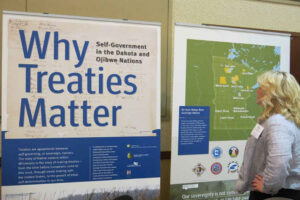Many tribal leaders and liaisons that NASAA interviewed through the Strengthening State Arts Agency Relationships with Tribal Communities initiative emphasized the importance of training as an important action step for state government employees. The state of Minnesota has placed a strong emphasis on that strategy.
Minnesota statutes acknowledge that “The state of Minnesota and Minnesota tribal governments significantly benefit from working together, learning from one another, and partnering where possible.” To this end, state law requires state agencies to have consultation policies to consult with Tribes when policies or practices of the state may affect any of the 11 federally recognized tribes in the state. Those tribes include seven Anishinaabe (Chippewa) reservations and four Dakota communities.
In Minnesota’s past, delayed or poorly executed consultations led to misunderstandings and frustration on behalf of both tribes and the state. So the state set out to encourage more frequent and better-informed tribal consultations. A comprehensive Tribal-State Relations Training Program is a cornerstone of that strategy.

The Why Treaties Matter traveling exhibit explores how the Dakota and Ojibwe treaties with the U.S. government affected the tribes in Minnesota and why those agreements still matter today. Photo courtesy of the Tribal-State Relations Training Program
A distinctive feature of Minnesota’s training strategy is that the curriculum is designed and delivered in partnership with the state’s 11 federally recognized tribes.
A Tribal-State Advisory Group on American Indian Training and Consultation was established to oversee the development the program. All of the tribes sharing geography with Minnesota participated, as did representatives from the Minnesota Indian Affairs Council, the Minnesota Department of Transportation, the Housing Finance Agency, the state Department of Human Services, the Minnesota Historical Society, the University of Minnesota, the Indian Land Tenure Foundation, the Minnesota Humanities Center and the American Indian Policy Center. The group examined common areas of policy conflict and took stock of topics that tribes highlighted as important for non-Native state workers to know.
The resulting curriculum prepares state agency employees with the knowledge and tools to work with tribes on matters of mutual interest and develop successful collaborations. Trainings are convened 10+ times per year in person on Native lands. The curriculum covers Native history, sovereignty and culture as well as key court cases and policy decisions that affect tribal life and culturally responsive strategies for resolving differences. In addition to building technical knowledge and skills, each training includes an arts experience, shared meals and other intentional efforts to cultivate cross-cultural understanding. Classes fill up quickly and are offered on a first-come, first-served basis. Online modules and “Lunch and Learn” sessions offer supplemental learning opportunities, but the program leaders emphasize that there is no substitute for in-person experiences on tribal lands.
Administered through the Minnesota Department of Transportation (MnDOT), the program has received national recognition as a model. It received a 2016 State Government Innovation Award from the Humphrey School of Public Affairs. The program also was a semifinalist in the Innovations in American Government Awards from Harvard University’s Kennedy School of Government.
Although the program is open only to Minnesota state employees, it promotes video resources produced by the Native Governance Center and the Minnesota Humanities Center that are available to the public: Why Sovereignty Matters, Why Tribal Governments Matter and Why Treaties Matter.
Some other states offer trainings similarly tailored to their own Native populations. Consult your state department of tribal relations or office of Indian affairs to inquire about availability. For more information about the Minnesota State-Tribal Relations Training Program, contact the MnDOT Training & Development team.
* * * * * * * * * * * * * * * * * *
Training Opportunities
Check to see whether your state offers training grounded in the specific tribal cultures of your region. If not, these online courses may help you get started.
Building Relationships with Native Nations: Native Know-How
Hosted by the University of Arizona and the Udall Center for Studies in Public Policy, this live training session is facilitated by Joan Timeche, executive director of the Native Nations Institute.
Native Knowledge 360° Essential Understandings
The National Museum of the American Indian’s Native Knowledge 360° initiative equips teachers with key concepts about the diverse cultures, histories and contemporary lives of Native Peoples. A video series accompanies the web resources.
The National Indian Health Board offers this free interactive e-course to build the capacity of state and federal government officials and other non-Native stakeholders to work more collaboratively with American Indian and Alaska Native tribes.
